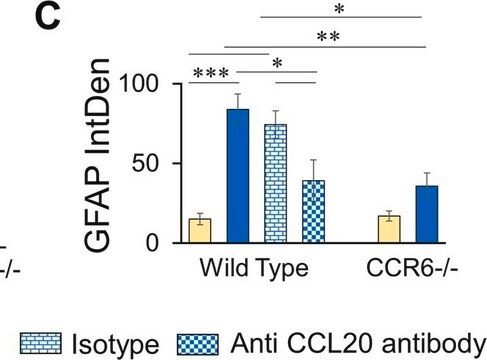ZRB2383
Anti-GFAP Antibody, clone 2E8, ZooMAb® Rabbit Monoclonal

recombinant, expressed in HEK 293 cells
Synonyme(s) :
GFAP
About This Item
Produits recommandés
Source biologique
rabbit (recombinant)
Niveau de qualité
Produit recombinant
expressed in HEK 293 cells
Conjugué
unconjugated
Forme d'anticorps
purified antibody
Type de produit anticorps
primary antibodies
Clone
2E8, monoclonal
recombinant monoclonal
Description
2E8 Clone
Gamme de produits
ZooMAb® learn more
Forme
lyophilized
Poids mol.
calculated mol wt 49.88 kDa
observed mol wt ~51 kDa
Espèces réactives
human, rat, mouse
Conditionnement
antibody small pack of 25 μL
Caractéristiques du produit alternatif plus écologique
Waste Prevention
Designing Safer Chemicals
Design for Energy Efficiency
Learn more about the Principles of Green Chemistry.
Validation améliorée
recombinant expression
Learn more about Antibody Enhanced Validation
sustainability
Greener Alternative Product
Technique(s)
immunocytochemistry: suitable using 1:100
immunofluorescence: suitable using 1:100
immunohistochemistry (formalin-fixed, paraffin-embedded sections): suitable using 1:100
western blot: suitable using 1:1,000
Isotype
IgG
Numéro d'accès UniProt
Autre catégorie plus écologique
, Aligned
Conditions d'expédition
ambient
Température de stockage
2-8°C
Modification post-traductionnelle de la cible
unmodified
Informations sur le gène
human ... GFAP(2670)
Description générale
Each ZooMAb antibody is manufactured using our proprietary recombinant expression system, purified to homogeneity, and precisely dispensed to produce robust and highly reproducible lot-to-lot consistency. Only top-performing clones are released for use by researchers. Each antibody is validated for high specificity and affinity across multiple applications, including its most commonly used application. ZooMAb antibodies are reliably available and ready to ship when you need them.
Learn more about ZooMAb here.
Spécificité
Immunogène
Application
Immunocytochemistry Analysis: A 1:100 dilution from a representative lot detected GFAP in C6 glioblastoma cells and primary cultures of rat glial precursor cells.
Immunohistochemistry (Paraffin) Analysis: A 1:100 dilution from a representative lot detected GFAP in rat brain and human brain tissue sections.
Description de la cible
Forme physique
Reconstitution
Stockage et stabilité
Informations légales
Clause de non-responsabilité
Vous ne trouvez pas le bon produit ?
Essayez notre Outil de sélection de produits.
Code de la classe de stockage
11 - Combustible Solids
Classe de danger pour l'eau (WGK)
WGK 1
Point d'éclair (°F)
Not applicable
Point d'éclair (°C)
Not applicable
Certificats d'analyse (COA)
Recherchez un Certificats d'analyse (COA) en saisissant le numéro de lot du produit. Les numéros de lot figurent sur l'étiquette du produit après les mots "Lot" ou "Batch".
Déjà en possession de ce produit ?
Retrouvez la documentation relative aux produits que vous avez récemment achetés dans la Bibliothèque de documents.
Les clients ont également consulté
Contenu apparenté
Choisissez des options éco-responsables pour vos recherches avec les anticorps recombinants ZooMAb®, une alternative plus écologique. Ces anticorps sans BSA et sans transporteur sont expédiés dans un emballage à faible volume de déchets et offrent une stabilité maximale sans compromettre les performances.
Choisissez des options éco-responsables pour vos recherches avec les anticorps recombinants ZooMAb®, une alternative plus écologique. Ces anticorps sans BSA et sans transporteur sont expédiés dans un emballage à faible volume de déchets et offrent une stabilité maximale sans compromettre les performances.
Greener ZooMAb® antibodies offer sustainable options with low-waste packaging and BSA-free formulation.
Greener ZooMAb® antibodies offer sustainable options with low-waste packaging and BSA-free formulation.
Notre équipe de scientifiques dispose d'une expérience dans tous les secteurs de la recherche, notamment en sciences de la vie, science des matériaux, synthèse chimique, chromatographie, analyse et dans de nombreux autres domaines..
Contacter notre Service technique











